Related Research Articles

The New Zealand national rugby union team, commonly known as the All Blacks, represents New Zealand in men's international rugby union, which is considered the country's national sport. Famed for their international success, the All Blacks have often been regarded as one of the most successful sports teams in history.

Barry John was a Welsh rugby union fly-half who played in the 1960s and early 1970s during the amateur era of the sport. John began his rugby career as a schoolboy playing for his local team Cefneithin RFC before switching to the first-class west Wales team Llanelli RFC in 1964. Whilst at Llanelli, John was selected for the Wales national team—as a replacement for David Watkins—to face a touring Australian team.
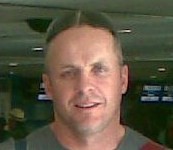
Christian Mathias Cullen is a retired New Zealand rugby union player. He played most of his rugby at fullback for New Zealand, for the Hurricanes in the Super 12, and for Manawatu, Wellington and later Munster at provincial level. He was nicknamed the Paekakariki Express and was considered to be one of the most potent running fullbacks rugby has ever seen. With 46 tries scored in 58 tests, Cullen is the 9th-highest try-scorer in international rugby.

The Australia national rugby union team, nicknamed the Wallabies, is the representative national team in the sport of rugby union for the nation of Australia. The team first played at Sydney in 1899, winning their first test match against the touring British Isles team.
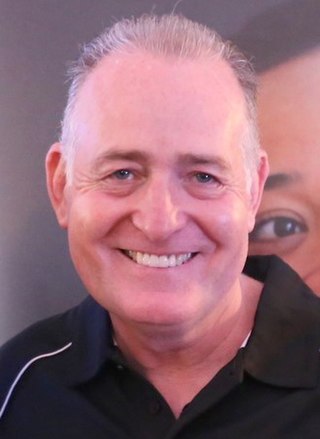
David Ian Campese, AM, also known as Campo, is a former Australian rugby union player (1982–1996), who was capped by the Wallabies 101 times, and played 85 Tests at wing and 16 at fullback.
In 1971 the British Lions toured New Zealand, also playing two matches in Australia. Despite losing the first match to Queensland the tour was a great success, the Lions winning the Test series against the All Blacks. They are still the only Lions side to have won a Test series in New Zealand. The side was captained by John Dawes, coached by Carwyn James and managed by Doug Smith.
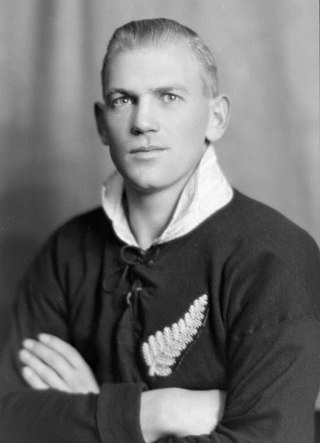
Eric William Thomas Tindill was a New Zealand sportsman. Tindill held a number of unique records: he was the oldest ever Test cricketer at the time of his death, the only person to play Tests for New Zealand in both cricket and rugby union, and the only person ever to play Tests in both sports, referee a rugby union Test, and umpire a cricket Test: a unique "double-double".

The Original All Blacks were the first New Zealand national rugby union team to tour outside Australasia. They toured the British Isles, France and the United States of America during 1905–1906. Their opening game, on 16 September 1905, was against Devon whom they defeated 55–4. They defeated every English side that they faced, including a 16–3 victory over English county champions Durham, and a 32–0 victory over Blackheath. They defeated Scotland, Ireland, and England with the closest of the three matches their 12–7 victory over Scotland. The team's only loss of the tour was a 3–0 defeat by Wales at Cardiff Arms Park. A try claimed by winger Bob Deans was not awarded by the referee and later became a subject of controversy. However, Wales were generally considered the better team with the All Blacks playing particularly poorly in the first half of the game. They managed narrow wins against four Welsh club teams and went on to play France in France's first-ever test match. They returned to New Zealand via North America where they played two matches against Canadian teams. Overall they played a total of thirty-five matches, which included five Tests, and only lost once—the defeat by Wales.
The Petone Rugby Football Club was founded in 1885 and has been the Wellington Premier Champion 39 times between 1895 and 2005. In addition, the club has won the Club Championship on 42 occasions between 1922 and 2005. Petone is a constituent club of the Wellington Rugby Football Union.

The National Rugby Union teams of France and New Zealand have been playing each other for over a century. The first encounter, during the historic 1905–1906 All Blacks tour of Europe and North America, which was also France's first Test, took place in Paris in January 1906 and was won by New Zealand 38–8. It was not until their third meeting, in 1954, that France secured their first win over New Zealand 3-0.

Kieran James Crowley is a New Zealand rugby union coach and former player, who is the former head coach of Italy. He has also coached the New Zealand Under-19s in the 2007 World Championships as well as coaching provincial side Taranaki. He previously served as head coach of Canada. He also spent five seasons coaching Benetton Rugby.
The 1972–73 New Zealand rugby union tour of the Britain, Ireland, France and North America was a collection of rugby union test match games undertaken by the All Blacks against England, Scotland, Wales, Ireland and France. The tour also took in several matches against British, Irish, French and North American club, county and invitational teams. This was the seventh tour of the Northern Hemisphere. It was also the first time the All Blacks lost to the invitational Barbarians team.
In 1959, the British Lions rugby union team toured Australia and New Zealand. The Lions won the two test matches against Australia but lost the international series against the All Blacks by three matches to one. They also played two matches in Canada, on the return leg of the journey.

Kenneth Francis Gray was an international rugby union player from New Zealand. He represented New Zealand in 24 international games, playing lock and later prop forward.
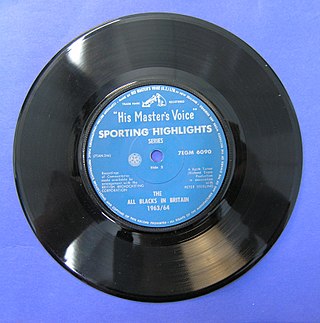
The 1963–64 New Zealand tour of Britain, Ireland and France was a rugby union tour undertaken by the New Zealand national rugby union team. The tour took in the five major Northern Hemisphere rugby nations of England, Scotland, Ireland, Wales and France. The tour also took in matches against club opposition and invitational county teams, ending in Europe with an encounter with the Barbarians. The final two games of the tour were played in Canada.
The 1979 New Zealand rugby union tour of England, Scotland and Italy was a series of eleven matches played by the New Zealand national rugby union team in England, Scotland and Italy in October and November 1979. The tour was very successful as the team won ten of the eleven games, including the international matches against Scotland and England. The only team to defeat the All Blacks was the English Northern Division.
The 1981 New Zealand rugby union tour of Romania and France was a series of ten matches played by the New Zealand national rugby union team in Romania and France in October and November 1981. The All Blacks won eight of the ten games, including the international match against Romania and both internationals against France. The only team to defeat the All Blacks was a French regional selection, and the All Blacks were also held to a draw by another regional team.
Kenneth Tautohe Going was a New Zealand rugby union player. A full-back, Going represented North Auckland at a provincial level as well as the New Zealand Māori and was a member of the New Zealand national side, the All Blacks.
The 2013 Australia national rugby union team tour of Great Britain, Ireland and Italy was a rugby union tour between the away team Australia and the homes teams of England, Ireland, Italy, Scotland and Wales. They also played an additional Test match against New Zealand, which acted as the third and final Bledisloe Cup match for 2013.
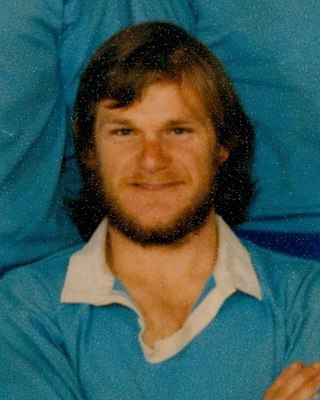
Douglas Leslie Rollerson was a New Zealand rugby union and rugby league player, and rugby union executive.
References
- 1 2 3 Allan Hewson at AllBlacks.com
- ↑ Rugby Heroes – A Photographic encyclopaedia of International Rugby Players
- ↑ "Allan Hewson new Ken Gray Academy Manager". Archived from the original on 19 February 2008. Retrieved 16 January 2008.